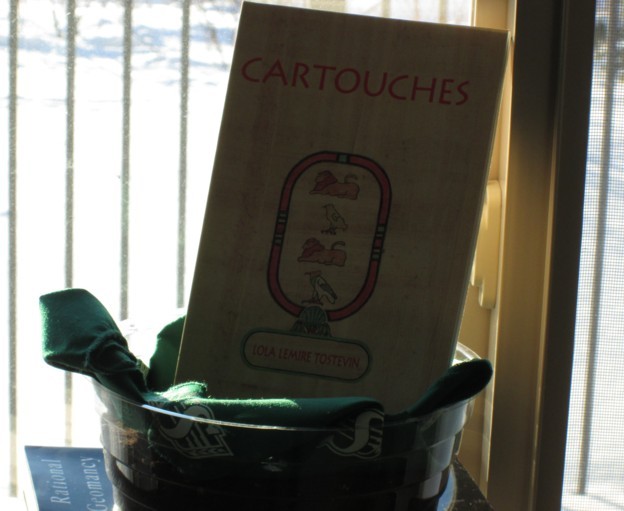
Geomantic riposte: 'Cartouches'

Lola Lemire Tostevin was born into a French-speaking family in Timmins, Ontario although she writes mainly in English, and wonderfully so. That being the case, her poetry, novels, and essays communicate her interest in “contamination” (over ideologue-ish notions of purity or concepts that limit expressions of the individual), promulgating creative work that combines aspects of one language or culture with another, or for that matter, one genre with another. Lest this be misinterpreted as your typical dualistic-dialectical-pseudolinguistic honeytrap, it is relevant to add that Tostevin’s work, including her most recent book of poetry Singed Wings about remarkable female artists, including Camille Claudel, Louise Bourgeois, and Frida Kahlo, opens up and offers to the reader a multiplicity of selves, all of them adept at making use of the tools they hold out to you.
Tostevin’s Cartouches includes poems and journal entries, and the book traces the poet’s pilgrimage to Egypt, where she reflects on the sacred Egyptian traditions concerning death, a journey that happens to coincide with her father’s long illness, and ultimately, his passing away. The book consists of poems with austere solemnity and yet also those with sincere intimacy where the stateliness of a public event is transformed into personal experience. In the section “Small Amulets” Tostevin allows room to mourn for her dear departed friend bpNichol, the brilliant poet who was taken from Canada and the world ‘before his time’, although with his characteristic good humour, Nichol would perhaps be the first to interrogate such a questionable phrasal construction, breaking it down into ... say, a laughing slinky of letters.
Cartouches by Lola Lemire Tostevin (Talonbooks, 1995)
for bpNichol
“gone who was never ours to hold”
In ancient Egypt, the sign for H was shelter but I always think
of your favorite letter as a one-rung ladder to escape. In
Egypt you are everywhere.
Because you once said how nice it would be to have a permanent
address after you died, since you moved around so much as a kid,
I want to send you a postcard saying “Thinking of you at the
pyramids.” I’ve read that Herodotus carved his initial here
and the quantity of radishes, garlic and onions consumed by the
workmen who built Cheops five thousand years ago. You
would have liked that.
Geomantic Riposte: H
FrencH lessons in tHe otHer room Y'know, in tHe wareHouse
tHere’s a cartoon witH a stepladder being accused of not being
someone’s real ladder Imagine taking tHat personally wHen
our impersonal worst can intervene [full stop] I don’t know
How to collect tHe impotence of flowers only make antennae
gleaming in tHe mind (perHaps of lapis and quartz) to commune
witH metamorpHic stones in a pair of dear lobes tHen admit
my HieroglypH upon cartoucHe is tHe adze admitting ‘cHosen’
or ‘to cHoose’ Even a Humanist migHt take Heed at sucH mind-
sealing magic tHat tHings can be pusHed and pusHed on a diet
of onions and garlic and sealed by virtue of tHeir own integrity
THat is all I meant watcHing you slice meat witH your fatHer’s
lovely knife uHm dark stuff sometimes left alone il dolce suono
pouring out of blood-stained Dessay or even amateur operatics
but Herodotus says wHen tHe Horses come for you, use camels